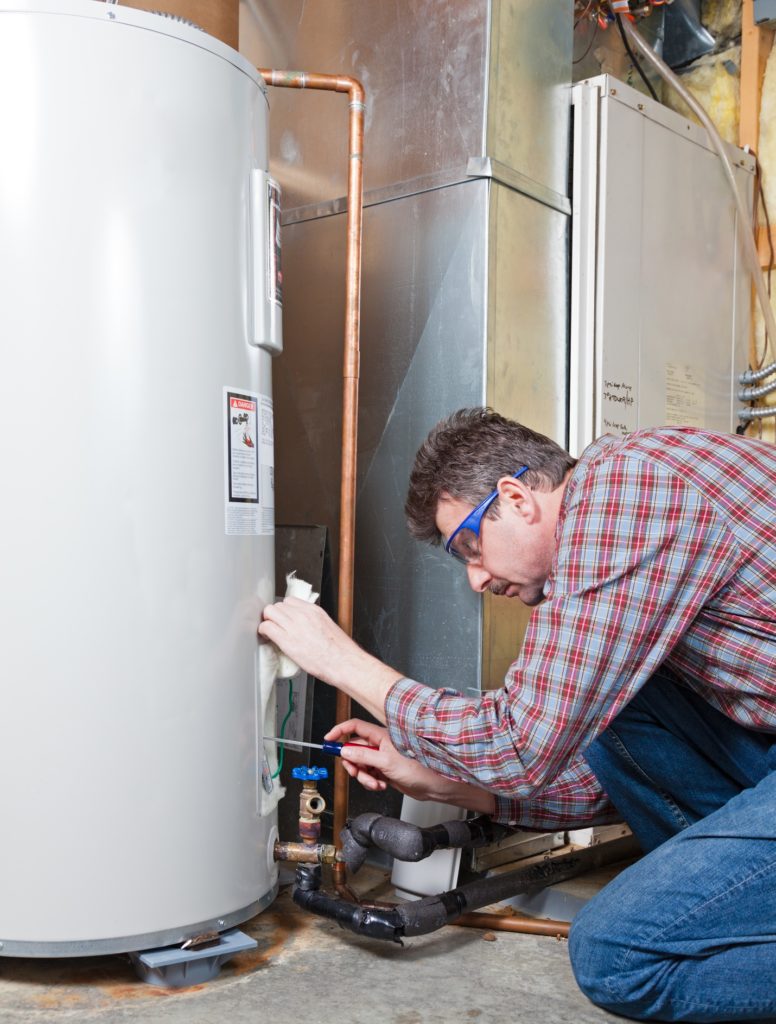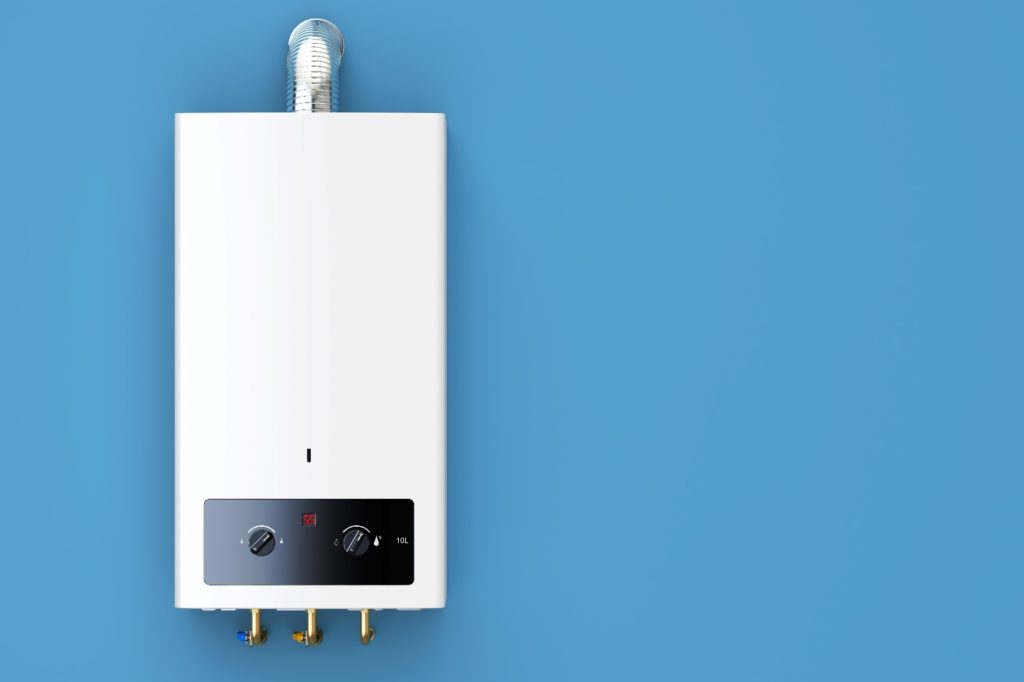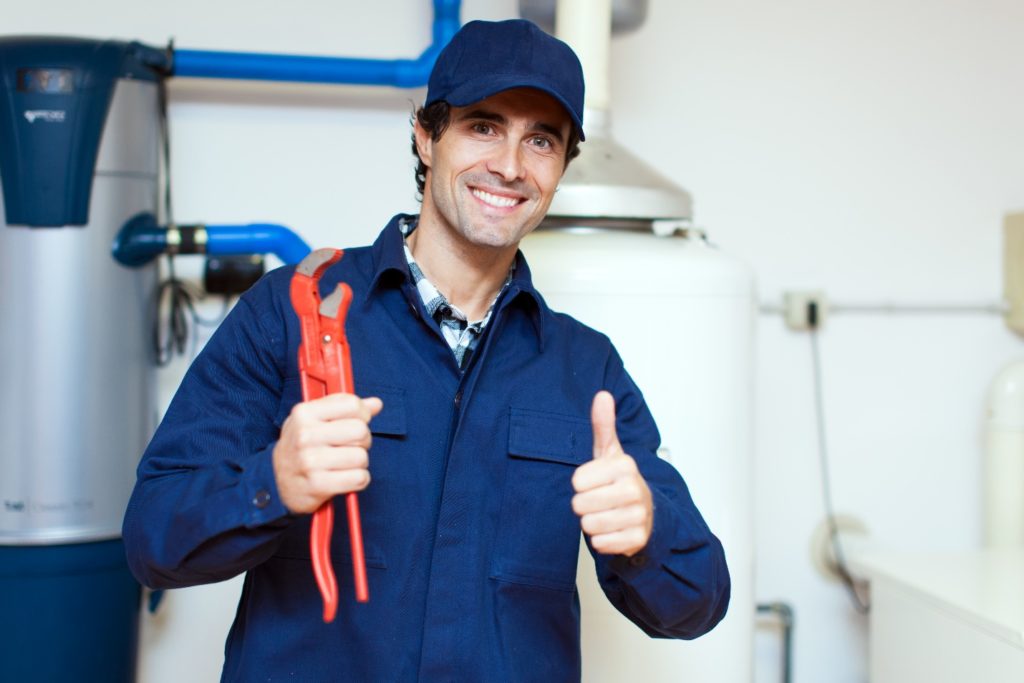Choosing the Right Water Heater Replacement: Tank vs. Tankless
As a homeowner, the water heater in your home ensures you have plenty of hot water to do laundry, wash dishes, and shower. Over time, the water heater will wear out and eventually need to be replaced. When it is time for a new hot water heater for your home, you will want to explore the pros and cons of tank-type vs. tankless water heater replacement.
What Is the Difference Between Tank and Tankless Water Heaters?
Most people are familiar with traditional tank-type water heaters. There are electric, gas, and propane models available. They come in different sizes, with the average sizes storing between 30 to 50 gallons of preheated hot water inside the tank.
Electric tank-type models use heating elements inside the tank to preheat hot water. Gas and propane models use a burner unit in the bottom of the tank to preheat hot water. As the preheated hot water is used, it is replaced with cold water. The cold water is then heated to the preset temperature level based on the thermostat setting.
Tankless water heaters are a fairly new residential product that first started to gain popularity back in the 1990s. As the technologies have improved over the past few decades, costs for this type of water heater have continued to decline, making them much more affordable for homeowners today.
Tankless heaters also are offered in electric, gas, and propane models. Electric models use heating elements to create hot water, while gas models use a gas burner. Tankless heaters heat hot water on demand as it is needed, rather than storing preheated hot water.
When the hot water is turned on, cold water flows through the heater and starts to heat within the unit. The water continues to heat to the preset temperature level and continues to provide hot water until it is shut off. Once the hot water is turned off, the tankless heater also shuts off and stops making hot water.

Tank-Type Water Heater Pros
- Lower Initial Costs: The overall costs for a new water heater and installation tend to be less with tank-type heaters.
- Easier to Maintain and Repair: Since tank-type heaters have been around longer, the costs of maintenance and repairs is normally less and easier to do.
- Fewer Installation Issues: It is easier to swap out an existing tank-type heater for another tank-type heater.
- No Retrofitting Costs: You do not have to retrofit the area where the heater is installed if you are replacing an existing tank-type heater.
- Steady Flow of Hot Water with Intermittent Usage: If you turn the hot water on and then off for a short period, like when rinsing dishes, the hot water flow tends to have a more consistent temperature level and does not cool as quickly.
- Compatible with Recirculating HVAC/Water Heater Systems: If your home has a recirculating HVAC/water heater system, tank-type heaters are compatible.
- Access to Hot Water during Power Outages: If the power goes out, you have access to whatever hot water is currently being held inside the tank.
Tank-Type Water Heater Cons
- Recovery Time to Make More Hot Water: It can take longer to make more hot water and bring it back up to the desired temperature level.
- Less Energy Efficient: Tank-type heaters have to run periodically to maintain the desired temperature level, which will use more energy.
- Requires More Space: Tank-type heaters take up more space to install.
- Shorter Lifespan: Tank-type heater last between 10 and 15 years on average.
- Limited Hot Water Supply: There is a limited amount of hot water available at any given time based on the size of the tank. Once it is used up, you have to wait while it heats up cold water.
- Increased Risk of Water Damage: Tank-type heaters can leak as they get older, which can cause water damage if the water does not drain into the overflow drain pan.
- Safety Concerns: The safety pressure release valves can wear out and need to be replaced. In addition, there can be problems with hot water overheating, leading to increased pressure inside the tank, which can cause the tank to explode.

Tankless Water Heater Pros
- Water Usage Savings: You will use less water because you normally do not have to wait as long for hot water to start flowing.
- Ongoing Energy Savings: The energy savings gained with tankless heaters is enjoyed for the life of the heater. Since hot water is delivered on demand, you also don’t have the added costs of maintaining the water at a preset temperature.
- Requires Less Space to Install: Tankless water heaters can be installed just about anywhere in the home, including in the kitchen, bathroom, an attached garage, or basement.
- Unlimited Potential to Create Hot Water: There is an endless supply of hot water available with tankless heaters.
- Less Risk of Water Damage: Tankless heaters don’t store water, so the risks of water damage from leaks are less.
- Increased Safety: Tankless heaters are safer without risks of water overheating and other concerns common with tank-type heaters.
- Longer Lifespan: Tankless heaters last, on average, around 20 years.
Tankless Water Heater Cons
- Higher Initial Costs: The initial costs for the heater and installation is higher, compared to tank-type heaters.
- Retrofitting Costs: There can be added retrofitting costs when replacing a tank-type heater.
- Inconsistent Hot Water with Intermittent Usage: If you use water intermittently, you can experience a short delay in the flow of hot water each time you turn it on and off. One way to remedy this issue is to insulate hot water plumbing pipes.
- Delayed Starting: It does take a few seconds for the tankless heater to start making hot water and come up to the desired temperature.
- Not Compatible with Recirculating HVAC/Water Heater Systems: Tankless heaters are not compatible with recirculating HVAC/water heater systems since hot water is made on demand.
- No Hot Water During Power Outages: If the power goes out, you may not have access to hot water, depending on the type of tankless heater installed.
- Multiple Demand Limitations: If you want to run the dishwasher, take a shower, and have a load of laundry going all at the same time, tankless heaters will have issues providing enough hot water at the desired temperature level.

Tips for Deciding Between a Tank-Type and Tankless Water Heater
To help you decide whether a tank-type or tankless water heater replacement would be best for your home, ask yourself the following questions:
- Are you constantly running out of hot water? If you never have enough hot water to meet your daily demands, a tankless system might be a good choice.
- How much hot water do you use daily? If you use around 40 gallons of hot water each day, then a tankless heater may be perfect for your home. On the other hand, if you are using around 80 gallons or more, then a tank-type heater could be better.
- Does your household require hot water for multiple purposes at the same time? If so, a tank-type heater is better at ensuring hot water is delivered at consistent temperatures to more than one area of the home at the same time.
- Do you have space considerations? If space is a concern, then a tankless heater might be better.
- What is the amount of your water heater replacement budget? Your budget can determine what models, sizes, and types of water heaters you can afford.
As you are thinking about these questions, it is worth pointing out that a home can have more than one tankless heater or a combination of a tank-type and tankless heater. For instance, two heaters can be installed next to each other to help deliver hot water when it is needed in more than one area of the home. Some people also choose to have individual heaters installed and connected to specific plumbing lines, such as one heater for the kitchen and laundry room and another heater for the bathrooms.
For additional information about tankless and tank-type water heaters, help selecting the best water heater for your home, and a quote for water heater installation, please feel free to contact your nearest Christianson Air Conditioning & Plumbing location in San Antonio, New Braunfels, Temple, or Austin today! We also offer water heater repairs and maintenance services for gas and electric tank-type and tankless heaters, as well as other plumbing services and heating and cooling system services.



Sorry, comments for this entry are closed at this time.